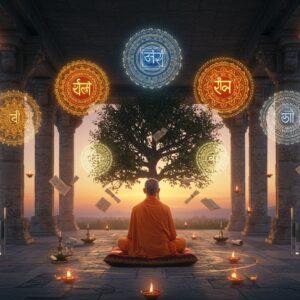
The Vedic Period (circa 1500-500 BCE) represents a pivotal era in ancient Indian history, celebrated for its spiritual, philosophical, and educational advancements. This period laid the groundwork for the ancient Indian education system, emphasizing holistic learning, character development, and the pursuit of knowledge. This resonates with the broader ancient Indian education system, which flourished in centers like Takshashila and Nalanda, focusing on subjects like mathematics, logic, and Indian religions. Similar to the Vedic system, these institutions emphasized comprehensive learning and character building, reflecting India’s rich intellectual heritage.
The Essence of Vedic Education
Education during the Vedic Period was not merely a process of acquiring information; it was a sacred duty, a rite of passage. It was a lifelong pursuit aimed at the holistic development of an individual – intellectual, spiritual, and physical. Learning was not confined to a specific age group but continued throughout life. This system, deeply intertwined with religious and cultural practices, sought to guide individuals towards ‘moksha,’ liberation from the cycle of birth and death, aligning with the broader spiritual ethos of ancient India.
The Gurukul System: A Foundation of Learning
Central to Vedic education was the Gurukul system. Students, known as ‘shishyas,’ resided with their teacher, the ‘guru,’ in an ashram. This immersive environment fostered informal yet disciplined learning, engaging students in both academic and practical activities. The guru-shishya relationship, built on mutual respect, trust, and devotion, mirrored the emphasis on mentorship and personalized learning prevalent in ancient Indian education centers like Takshashila.
The curriculum encompassed a wide range of subjects, including Vedic literature, philosophy, astronomy, mathematics, and physical education. This comprehensive approach echoes the broad curricula offered in ancient institutions like Nalanda, which covered diverse fields, including Buddhist and Vedic studies, logic, and medicine.
The Gurukul system instilled self-discipline, moral values, and character development, fostering community living and social responsibility, much like the holistic approach to education in ancient India that aimed to develop well-rounded individuals.
Curriculum and Subjects: A Holistic Approach
The Vedic curriculum was designed for holistic development. Core subjects included the study of the Vedas, Upanishads, and other sacred texts, reflecting the spiritual and philosophical focus of the era. The inclusion of sciences like astronomy and mathematics demonstrates the importance given to understanding the natural world. Physical education, music, arts, and crafts nurtured physical prowess and creativity. The emphasis on oral learning, memorization, and recitation ensured the transmission of knowledge across generations. This mirrors the ancient Indian educational approach where oral tradition and memorization played a crucial role in preserving and disseminating knowledge.
Women in Vedic Education: Breaking Barriers
Contrary to some misconceptions, women actively participated in Vedic education. Brahmavadinis pursued lifelong learning, while Sadyavadhus studied until marriage. Women engaged with the Vedas and other scriptures, contributing to intellectual discussions. The presence of renowned female scholars and philosophers underscores the progressive nature of Vedic society regarding gender equality in education, a concept that resonated, albeit to varying degrees, within the broader ancient Indian education landscape. This emphasis on education for women aligns with the broader recognition of women’s intellectual capabilities in ancient India, although access to education varied across different periods and social groups.
The Vedas: The Heart of Learning
The Vedas served as the primary source of knowledge, encompassing philosophy, science, and the arts. Their study was paramount, offering insights into the universe, life’s purpose, and virtuous living. The meticulous recitation and memorization of these sacred texts preserved the oral tradition, transmitting knowledge through generations. The Vedas provided a framework for moral and ethical conduct, shaping the character and values of students. This focus on sacred texts and moral development resonates with the broader emphasis on ethical and spiritual education within the ancient Indian education system.
Educational Infrastructure: Simple yet Effective
Vedic educational institutions, primarily Gurukuls, were often situated in serene natural settings. The infrastructure was simple yet conducive to learning, with open spaces for discussions and activities. The self-sustaining nature of ashrams, where students and teachers participated in daily chores, fostered a sense of community and responsibility. This emphasis on simplicity and connection with nature aligns with the broader ancient Indian educational philosophy that valued a balanced lifestyle and integration with the natural world.
A Lasting Legacy
The Vedic education system profoundly influenced subsequent educational traditions in India. Its emphasis on holistic development, moral values, and the guru-shishya relationship continues to resonate in modern educational philosophies. The enduring reverence for teachers and the pursuit of knowledge reflect its lasting impact. This system significantly contributed to India’s rich intellectual and spiritual heritage. It’s important to note that while the Vedic system laid a foundation, the ancient Indian education system evolved over time, encompassing diverse approaches and institutions, reflecting the dynamic nature of knowledge and learning in ancient India.
Poojn.in: Supporting Vedic Traditions
Poojn.in, India’s leading online store for cultural and religious goods, offers a wide selection of products to support Vedic educational practices and honor Goddess Saraswati, the deity of knowledge and learning. Explore our collection of authentic puja items:
- Brass Idols of Goddess Saraswati: Adorn your study spaces with beautifully crafted idols to invoke blessings for academic success. We offer a variety of sizes and styles to suit your preferences.
- Puja Thalis for Saraswati Worship: Find complete thalis with all the essential items required for Saraswati puja, ensuring a reverent and authentic ceremony.
- Sacred Texts and Books: Delve deeper into Vedic knowledge with our collection of scriptures and commentaries, providing valuable insights into ancient wisdom.
- Copper and Brass Vessels: Acquire traditional vessels for use in rituals and ceremonies, adding authenticity to your practices.
- Cotton Wicks and Ghee: Illuminate your sacred space with pure cotton wicks and ghee for traditional lamps, creating a serene atmosphere for learning and reflection. We source high-quality ghee to ensure purity and sanctity.
- Natural Incense and Dhoop: Enhance your environment with the calming fragrance of natural incense and dhoop, promoting focus and concentration during study. Our incense is crafted from traditional recipes using natural ingredients.
Poojn.in is committed to providing authentic and high-quality products for all your cultural and religious needs. Visit us today to explore our extensive collection.


